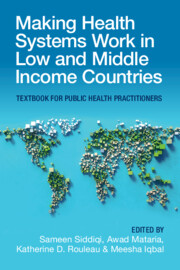 Making Health Systems Work in Low and Middle Income Countries
Making Health Systems Work in Low and Middle Income Countries from Section 2 - Transforming Health Systems: Confronting Challenges, Seizing Opportunities
Published online by Cambridge University Press: 08 December 2022
This Chapter provides health policymakers, managers, and care providers with an overview of strategies that enforce the key principles of good governance presented in Chapter 4. Strengthening participatory governance, building policy capacity, institutionalizing procedures to incorporate evidence in policymaking, and building regulatory capacity are critical for strengthening participation, transparency, and accountability and enforcing the rule of law. There is a variety of potential strategies that health system managers can adapt to improve governance of health systems at the policy, institutional, and healthcare professional levels, these include: (1) strengthening effectiveness of decentralization at the policy level; (2) linking accreditation to incentives, such as public funding or contractual agreements, at the institutional level; and (3) professionally led self-regulation at the health care professionals’ level. Control of corruption requires political reforms with a focus on open exchange of information, channels for participation of citizens in policymaking, and penalties for the misuse of power. It is important to note that the evidence on governance strategies in L&MICs remains elusive. Health leaders and managers need to cautiously assess and adapt strategies to their own contexts.
To save this book to your Kindle, first ensure no-reply@cambridge.org is added to your Approved Personal Document E-mail List under your Personal Document Settings on the Manage Your Content and Devices page of your Amazon account. Then enter the ‘name’ part of your Kindle email address below. Find out more about saving to your Kindle.
Note you can select to save to either the @free.kindle.com or @kindle.com variations. ‘@free.kindle.com’ emails are free but can only be saved to your device when it is connected to wi-fi. ‘@kindle.com’ emails can be delivered even when you are not connected to wi-fi, but note that service fees apply.
Find out more about the Kindle Personal Document Service.
To save content items to your account, please confirm that you agree to abide by our usage policies. If this is the first time you use this feature, you will be asked to authorise Cambridge Core to connect with your account. Find out more about saving content to Dropbox.
To save content items to your account, please confirm that you agree to abide by our usage policies. If this is the first time you use this feature, you will be asked to authorise Cambridge Core to connect with your account. Find out more about saving content to Google Drive.